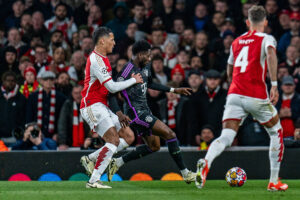This week, Miroslav Klose bade farewell to football as a player, and announced his intention to become a coach by joining the staff of the German national team under Joachim Löw. If Klose achieves as much as a coach as he did as a player, then he will join the most exclusive club in world football, those who have won the World Cup as both a player and a manager. Currently, it has only two members: Klose’s compatriot, Franz Beckenbauer and Brazil’s Mario Zagallo. However, if anyone can join them in the future, it is surely Klose.
Klose has earned comparison with those all-time greats because he has been almost a throwback to the time when international football was undoubtedly the pinnacle of the game, unlike now when it is increasingly under pressure from the growing power of club football. Klose is certainly unusual among modern star players in that his achievements as an international player outstrip his achievements at club level.
For Germany, he not only won a World Cup (in 2014) but played in another losing World Cup final (in 2002) and reached a third major international final at the European Championships in 2008, losing to Spain. By contrast, although he won a couple of league titles and a pair of German Cups with Bayern Munich during his spell with Germany’s uber-club between 2007 and 2011, he was never the “main man” for the Bavarian giants as he was for Germany for most of his international career. Like many of the greats of the past, Klose’s real arena was international football.
Record Breaker
He first emerged as a top-class international striker at the World Cup in Japan and South Korea in 2002, when he scored five goals, all of them headers, including a hat-trick against Saudi Arabia in the group stage. Klose was always a magnificent header of the ball and that prowess was demonstrated at his first major tournament.
He would go on to become almost synonymous with the World Cup. He competed in four tournaments in total and eventually became the all-time top scorer not only at World Cup tournaments, with 16 in total, but the all-time top scorer for the German national team, with 71.
When he finally overtook the great Gerd Müller’s previous high for Germany of 68 at the 2014 World Cup, the typically self-effacing Klose was the first to point out that Müller had achieved his extraordinary tally in only 62 games whereas he had played almost twice as many games to get the same number of goals.
Success at Last
For so long, Klose was the ultimate “always the bridesmaid, never the bride” type of player, in that he got so close with Germany to winning major tournaments but always fell at the final hurdle.
He certainly encountered some exceptional opposition: first, the fine Brazilian side of 2002, with “the three Rs” of Ronaldo, Rivaldo and Ronaldinho. In 2006 a resurgent Italian team, who, like their predecessors in 1982, overcame domestic troubles with the Calciopoli scandal to triumph on the global stage. Finally, and most dauntingly, there was the great Spanish side. They won three successive major tournaments between 2008 and 2012, twice beating Germany en route to silverware.
There is a certain irony in that Klose eventually won a trophy for the German national team only after he had lost his pre-eminent position in the team. For much of his international career, he was probably Germany’s best player, and perhaps lacked enough equally talented players alongside him to win a tournament.
In Brazil in 2014, he was initially left out of the first team, but as Germany progressed to a semi-final clash with the hosts, Joachim Löw felt compelled to name Klose in his starting XI. Löw was amply rewarded as Klose scored in the famous 7-1 win over Brazil and retained his place for the final, which Germany eventually won in extra time thanks to Mario Götze’s spectacular winner.
Klose’s eventual starring role in the 2014 World Cup win was thoroughly deserved, not least because he belatedly provided the kind of direct threat and physical presence that only a traditional centre-forward or striker can provide. Löw’s squad contained several star number 10s in Mesut Özil, Thomas Müller and Götze himself, but Klose was the only real penalty-box poacher and his addition to the first team ultimately proved decisive.
Germany have produced so many great strikers over the decades that it is questionable where Klose figures in their pantheon of forwards. However, a strong case can be made for Klose being the best German striker since Müller.
When one considers how many great German strikers there have been between them—from Jupp Heynckes in the ‘70s to Karl-Heinz Rummenigge in the ‘80s and Rudi Völler in the early ‘90s—that is quite an accolade. But it is deserved, given that none of the others were ever as important to the national side, not only over such a long period as Klose was but in playing such a key role in eventually winning a World Cup.
Post-Retirement
Now, of course, Klose will attempt to make the difficult transition from player to coach, but arguably he already has a head-start by virtue of his sophisticated tactical knowledge, which he again referred to this week: “Reading a game, preparing painstakingly, developing strategies and tactics have always intrigued me and interested me a lot as a player. I am very grateful to Jogi Löw and Hansi Flick for this opportunity to sharpen my ideas now in practice.”
Tactical Awareness
As Klose demonstrates by talking about “developing strategies and tactics”, it seems that he is very interested in, and consequently very talented at, the tactical side of the game. This will make his transition to coaching and management easier, especially in the international game where the tactical battle is often even more important than in the club game.
Klose, of course, is already familiar with the tactical nuances of the game and his already considerable tactical and strategic knowledge of the game will only be enhanced by spending so much time in such close proximity to Löw. If he can learn from the master, his former manager, then the new apprentice will undoubtedly achieve some magical triumphs of his own.
Main Photo






